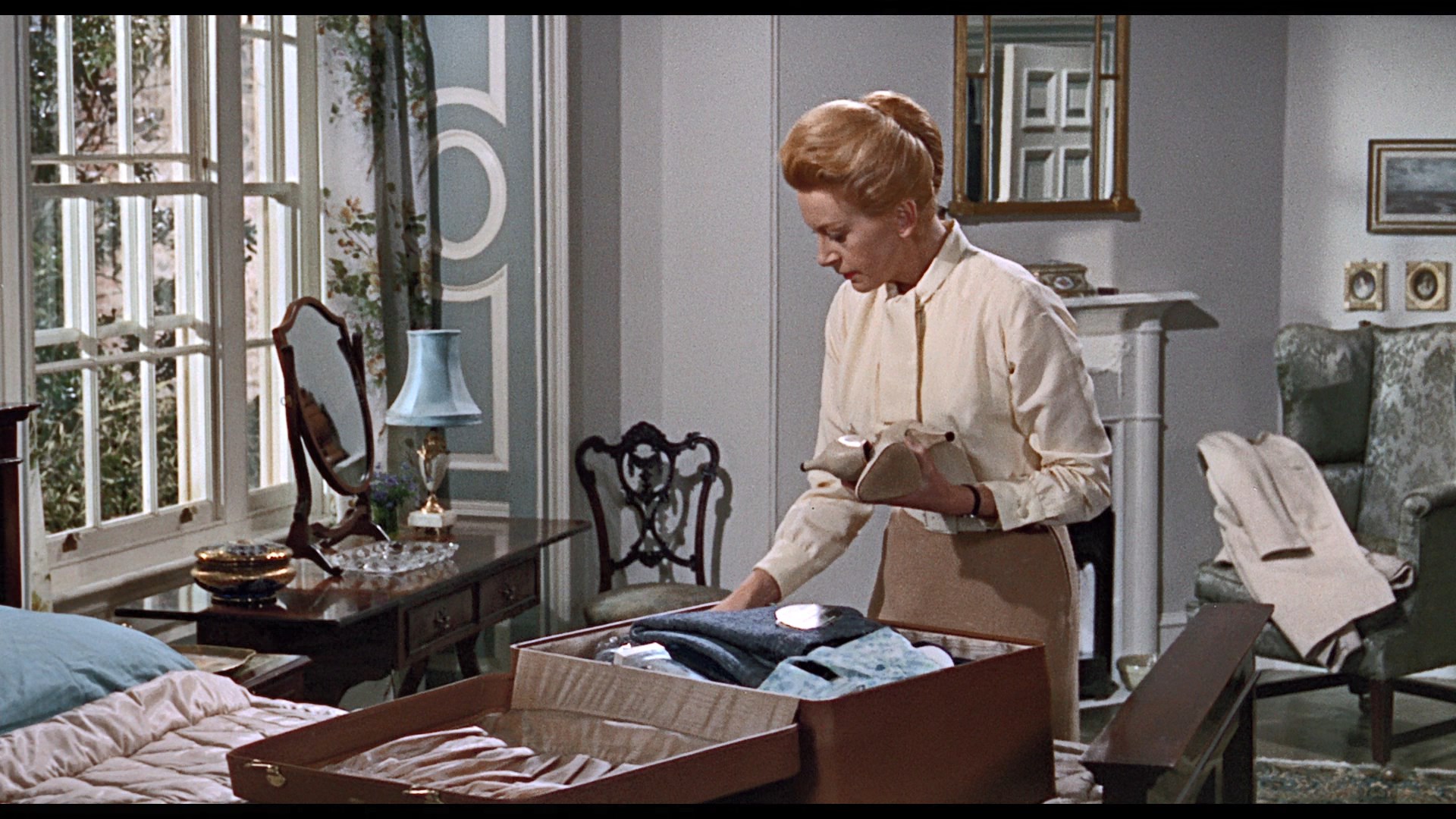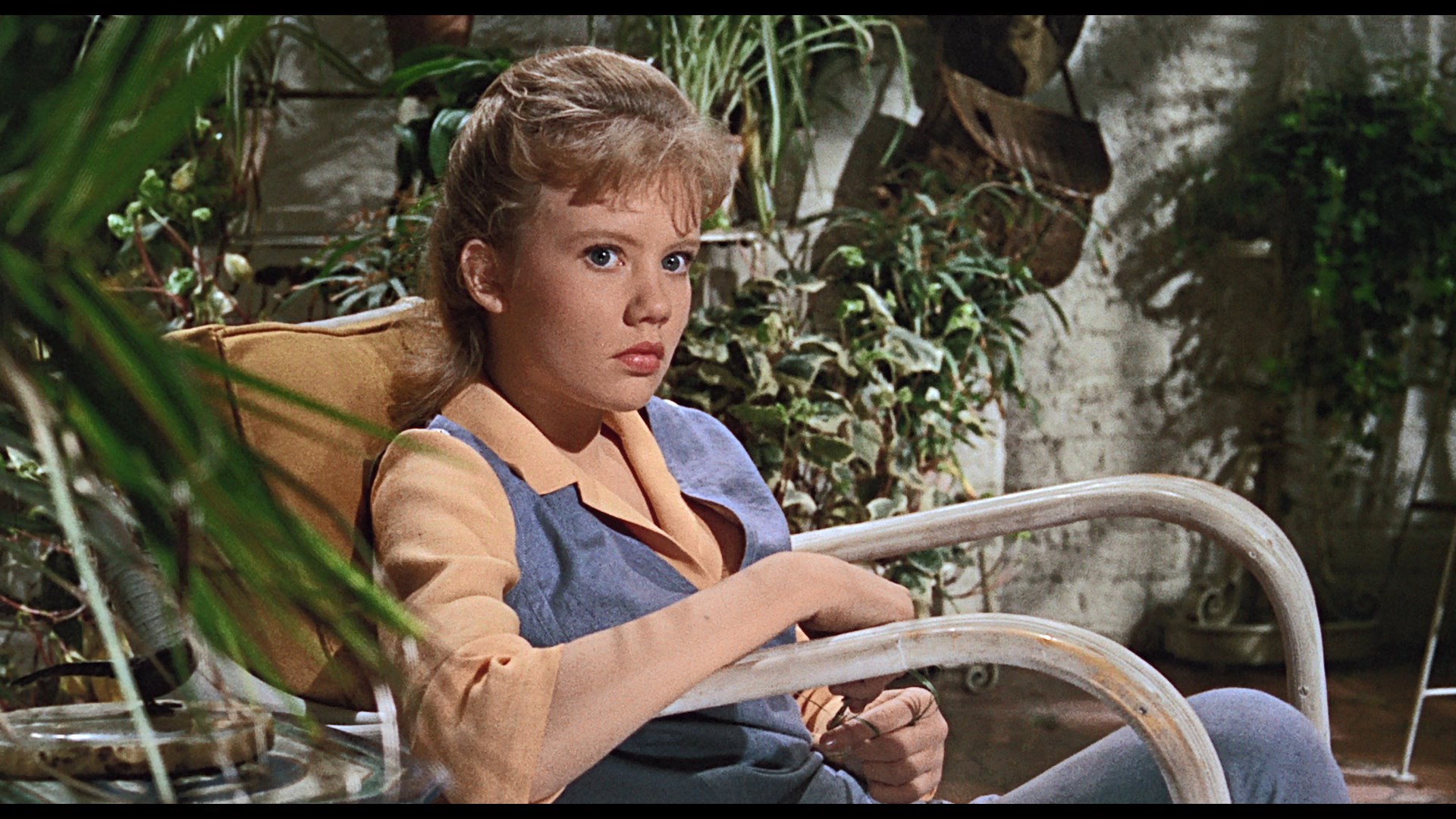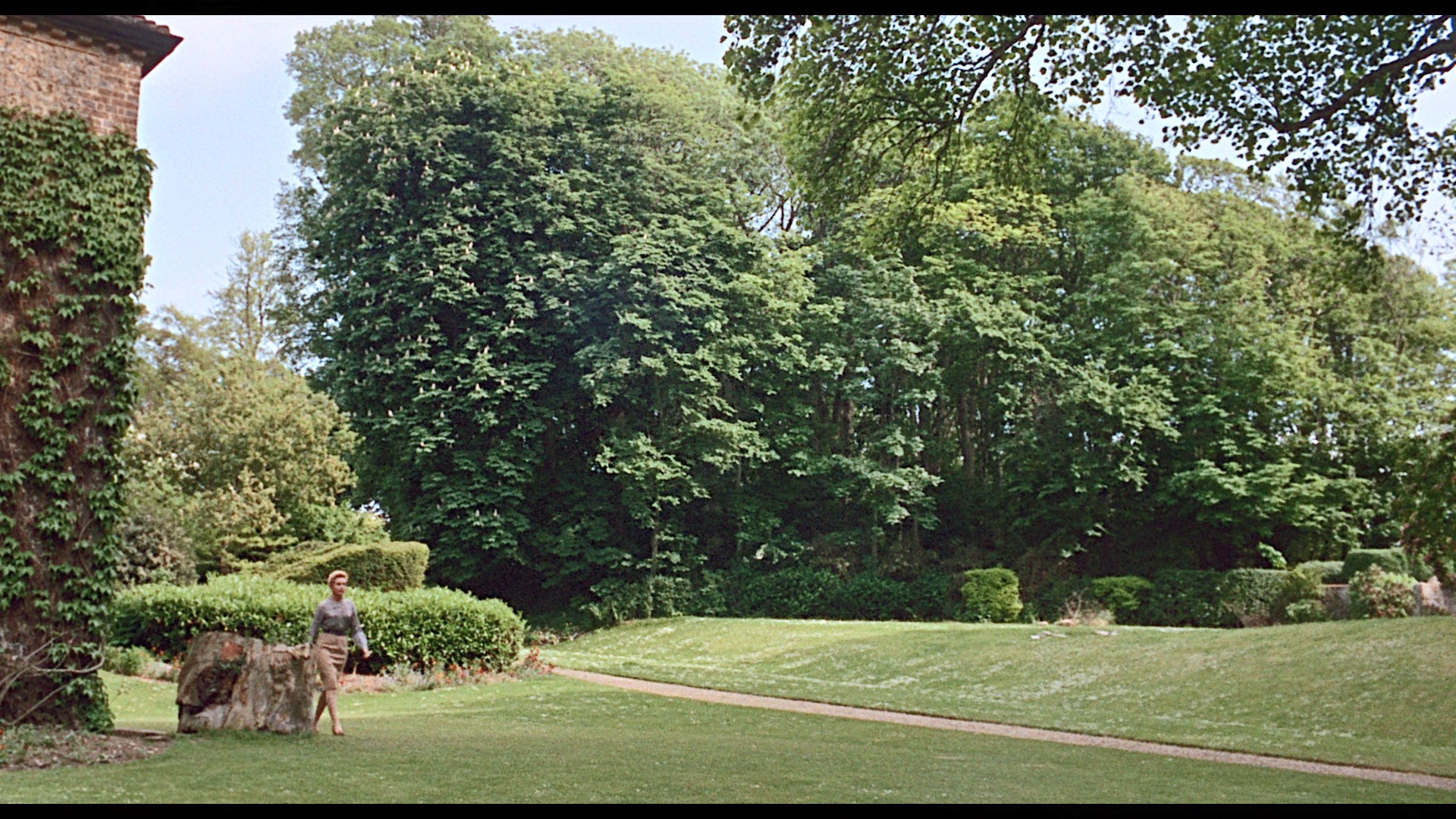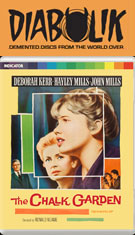
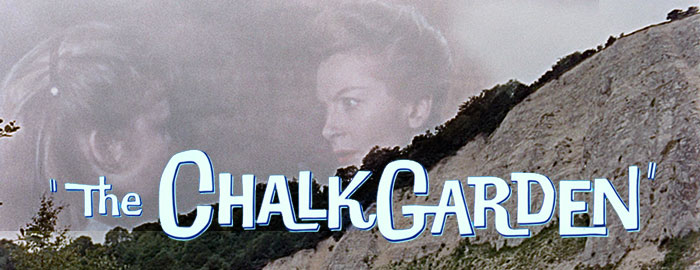
Color, 1964, 106 mins. 19 secs.
Directed by Ronald Neame
Starring Deborah Kerr, Hayley Mills, John Mills, Edith Evans
Indicator (Blu-ray) (UK RB HD), Kino Lorber (Blu-ray) (US RA HD), Universal (DVD) (US R1 NTSC) / WS (1.85:1) (16:9)
Once 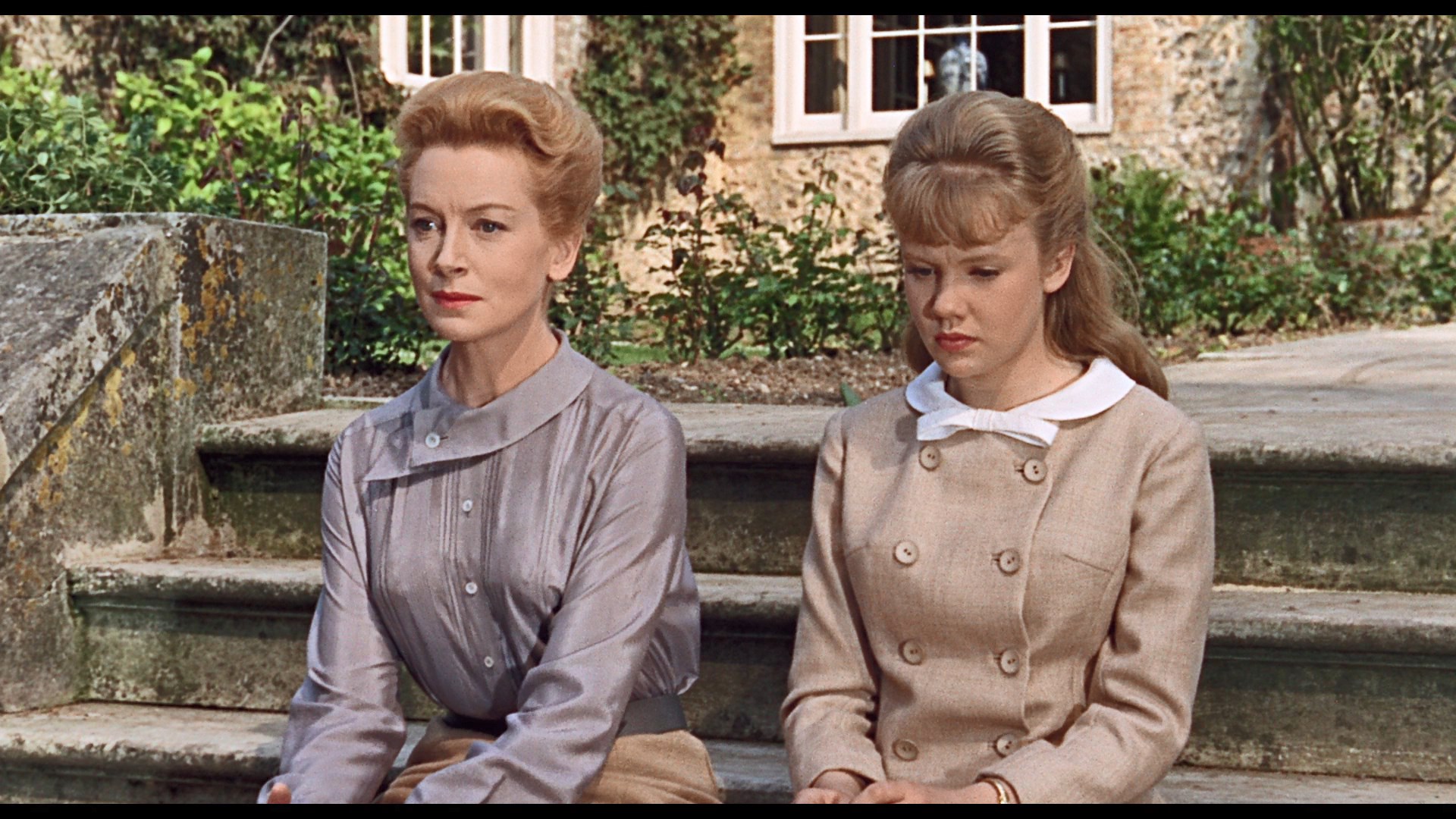 upon a time, the film industry around the world had a steady supply
upon a time, the film industry around the world had a steady supply  of material thanks to successful stage plays that could be easily translated into big screen entertainment with famous actors ready to bite into roles that might rack up a handful of awards. One unusual example came along in 1964 with The Chalk Garden, an adaptation of a successful stage drama by Enid Bagnold first mounted in 1955 about a dysfunctional household veered on a very different course by the arrival of a new governess. Various actors like Fritz Weaver and Peggy Ashcroft appeared in the London and American productions during its heyday, though only Edith Evans ended up making the leap to the feature film version when it finally arrived under the guidance of mega-producer Ross Hunter, who scored hits at Universal with a string of Douglas Sirk films and one-off classics like Pillow Talk and Airport before crashing in flames with Lost Horizon. This film marks something of a departure for him, trading the flamboyant melodrama and wild comedy for an ambiguous story that, like other genre-toying plays like An Inspector Calls, feels like it's about to turn into a murder mystery thriller at any moment but keeps changing course unexpectedly.
of material thanks to successful stage plays that could be easily translated into big screen entertainment with famous actors ready to bite into roles that might rack up a handful of awards. One unusual example came along in 1964 with The Chalk Garden, an adaptation of a successful stage drama by Enid Bagnold first mounted in 1955 about a dysfunctional household veered on a very different course by the arrival of a new governess. Various actors like Fritz Weaver and Peggy Ashcroft appeared in the London and American productions during its heyday, though only Edith Evans ended up making the leap to the feature film version when it finally arrived under the guidance of mega-producer Ross Hunter, who scored hits at Universal with a string of Douglas Sirk films and one-off classics like Pillow Talk and Airport before crashing in flames with Lost Horizon. This film marks something of a departure for him, trading the flamboyant melodrama and wild comedy for an ambiguous story that, like other genre-toying plays like An Inspector Calls, feels like it's about to turn into a murder mystery thriller at any moment but keeps changing course unexpectedly.
At a remote coastal home in Sussex, the well-to-do Mrs. St. Maugham (Evans) and her servant, Maitland (John Mills), have been left to care for her granddaughter, Laurel (Hayley Mills), whose flighty, irresponsible mother has taken off with her new beau. A quest for a new governess results in the arrival of Miss Madrigal (Kerr), who has no experience or references but is taken on by the desperate lady of the house. A self-proclaimed pyromaniac, the 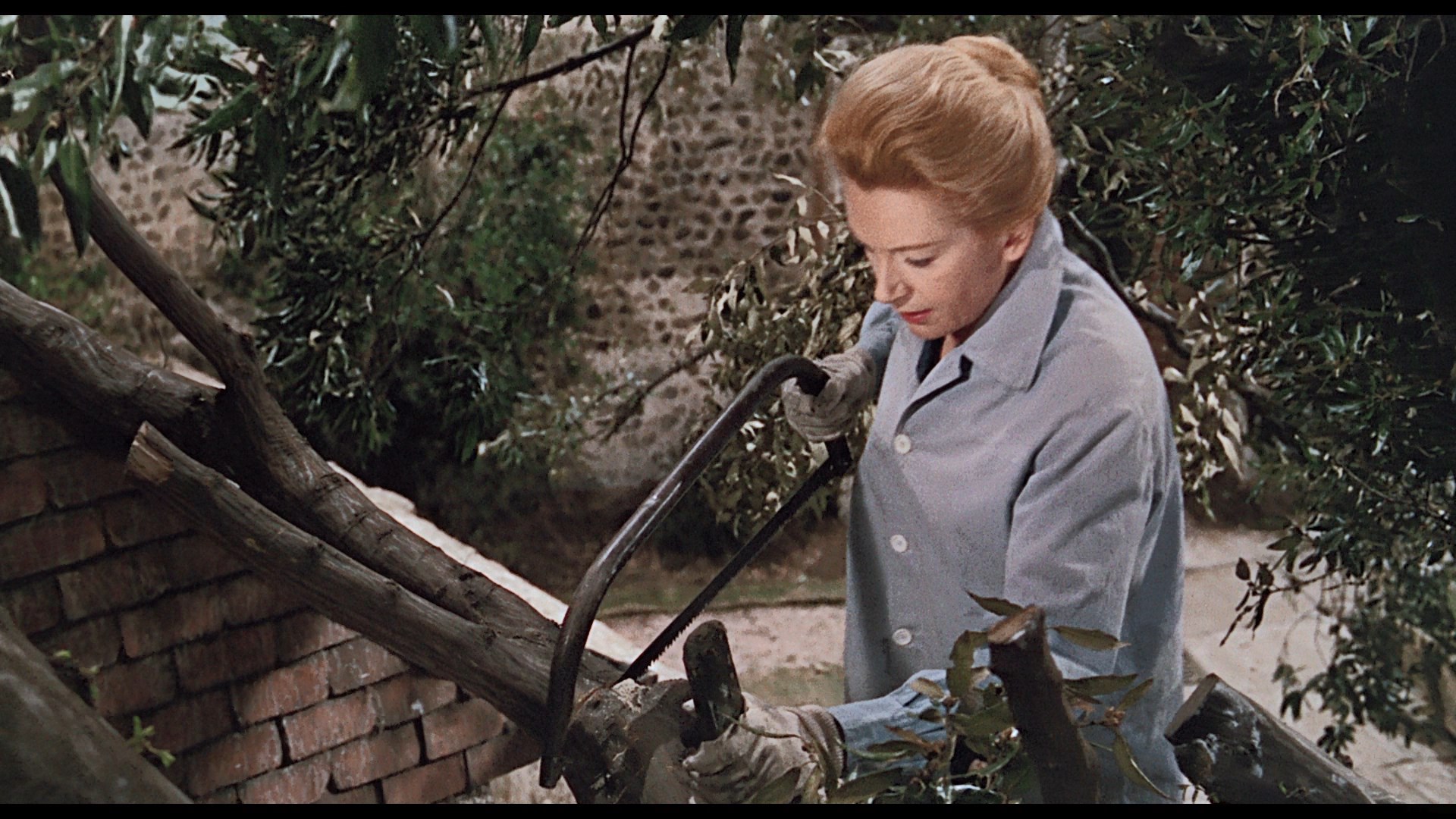 precocious Laurel is resistant to the
precocious Laurel is resistant to the  latest addition to the household and does her best to expose Miss Madrigal's past with unexpected results.
latest addition to the household and does her best to expose Miss Madrigal's past with unexpected results.
Essentially a showcase to watch the four main actors strut their stuff (with father and daughter Mills shining in one of their multiple collaborations together), The Chalk Garden tweaks its source material in many ways by filing away some of the more peculiar digressions and beefing up Maitland's character significantly. Kerr's mannered acting style can be either a magnificent asset or a stumbling block depending on the film, but it works here nicely as her character has her guard up anyway for significant portion of the running time and has to gradually work her way into the good graces of her young charge. The setting is also used to great effect with the famous White Cliffs of Dover making a strong backdrop right from the opening credits, and despite the potential for tragedy or sudden plot turns, the story is ultimately quite tranquil and upbeat with a resolution designed to leave the theater with smiles on their faces.
Virtually impossible to see for years outside of scarce TV airings, this film finally popped up on DVD in 2010 as an MOD title in the Universal Vault Series with no extras. It took ten more years, but in 2020, Kino Lorber debuted the film on Blu-ray featuring a new audio commentary by Tim Lucas, the theatrical trailer, and bonus trailers for Meteor, Endless Night, and Separate Tables. The HD master looks true to the source and typical of Ross Hunter productions of the era, with very vivid color schemes and a somewhat gritty, processed look that the studio tended to favor at the time. (See other ones around the same time like Portrait in Black and Madame X.) The commentary is a solid one as expected, starting off with a bit about the pivotal location before diving deep into the stories behind the various cast members and technical personnel as well as the source play.
The following year in 2021, Indicator brought the film to U.K. Blu-ray as a limited 3,000-unit edition featuring a scan that looks virtually identical in terms of framing, color timing, and compression; you'll be happy with either option. The LPCM 2.0 mono English track (with optional improved English SDH subtitles) compares favorably as well to the DTS-HD option on the U.S. disc. This time you get an audio commentary by Lucy Bolton and Josephine Botting, who  bring a very different British perspective here pointing out aspects of the setting, the theatrical connections of the cast members, more about the play's history in
bring a very different British perspective here pointing out aspects of the setting, the theatrical connections of the cast members, more about the play's history in  London, the differences between the play and script, and the dramatic treatment of the characters within the social confines they would've experienced at the time. Recorded in 1991 over the course of three days, "The BEHP Interview with Ronald Neame" is a 106m19 audio interview with the director conversing with Roy Fowler about his career including his bittersweet childhood in showbiz and his origins as a cinematographer (among other duties) before becoming the director of such films as this, Tunes of Glory, The Horse's Mouth, Gambit, The Prime of Miss Jean Brodie, and The Poseidon Adventure, with some insightful thoughts on the evolution of the British film industry along the way and Hollywood figures like George Cukor. In a welcome touch, the film can also be played with an isolated music and effects track so you can enjoy the score by Malcolm Arnold (The Bride on the River Kwai, Four Sided Triangle), which remains unreleased in any other format. In "Fertile Ground" (7m14s), assistant production accountant Maurice Landsberger discusses his memories of making this and other films as Eastbourne as well as his memories of the "demanding" Hunter, followed by a short silent reel of 8mm location footage (1m10s) shot by John Mills at Beachy Head. Then the always welcome David Huckvale contributes another of his fine film score analyses in "Clever Conversation" (21m19s) looking at the stylistic approach of the composer, his background, and the influence of jazz and classic music on his work. Finally in "Loved and Envied" (10m20s), Botting returns to look at the entire career of Bagnold including his most famous work, National Velvet, and her life rubbing shoulders with the likes of Virginia Woolf and the turbulent process of bringing The Chalk Garden to the stage with the involvement of Cukor and Gladys Cooper. Also included are the trailer and a substantial gallery of stills and promotional material, while the 32-page insert booklet sports liner notes by Melanie Williams ("Is It a Crime to Want to Be Remembered?") who analyzes the transition from stage to screen and the crucial presence of young rising star Hayley Mills, an extensive making-of essay by Bethan Roberts, and sample critical reactions from the initial release.
London, the differences between the play and script, and the dramatic treatment of the characters within the social confines they would've experienced at the time. Recorded in 1991 over the course of three days, "The BEHP Interview with Ronald Neame" is a 106m19 audio interview with the director conversing with Roy Fowler about his career including his bittersweet childhood in showbiz and his origins as a cinematographer (among other duties) before becoming the director of such films as this, Tunes of Glory, The Horse's Mouth, Gambit, The Prime of Miss Jean Brodie, and The Poseidon Adventure, with some insightful thoughts on the evolution of the British film industry along the way and Hollywood figures like George Cukor. In a welcome touch, the film can also be played with an isolated music and effects track so you can enjoy the score by Malcolm Arnold (The Bride on the River Kwai, Four Sided Triangle), which remains unreleased in any other format. In "Fertile Ground" (7m14s), assistant production accountant Maurice Landsberger discusses his memories of making this and other films as Eastbourne as well as his memories of the "demanding" Hunter, followed by a short silent reel of 8mm location footage (1m10s) shot by John Mills at Beachy Head. Then the always welcome David Huckvale contributes another of his fine film score analyses in "Clever Conversation" (21m19s) looking at the stylistic approach of the composer, his background, and the influence of jazz and classic music on his work. Finally in "Loved and Envied" (10m20s), Botting returns to look at the entire career of Bagnold including his most famous work, National Velvet, and her life rubbing shoulders with the likes of Virginia Woolf and the turbulent process of bringing The Chalk Garden to the stage with the involvement of Cukor and Gladys Cooper. Also included are the trailer and a substantial gallery of stills and promotional material, while the 32-page insert booklet sports liner notes by Melanie Williams ("Is It a Crime to Want to Be Remembered?") who analyzes the transition from stage to screen and the crucial presence of young rising star Hayley Mills, an extensive making-of essay by Bethan Roberts, and sample critical reactions from the initial release.
Indicator (Blu-ray)
Kino Lorber (Blu-ray)
Reviewed on April 30, 2021
![]()


